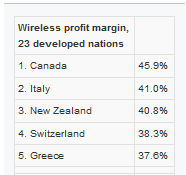This article talks about how the wireless market today in Canada is “functioning well”, in terms of technological advancements and pricing levels.
Factually, the data and numbers are supported by a report from CRTC. However…
The wireless services market is dominated by the Big 3 (Rogers, Telus, and Bell). Smaller companies, such as Fido, Chatr, and Virgin Mobile, are actually subsidiaries of the Big 3. Canadian consumers have very little choice. The Big 3 can strategically market the subsidiary companies to contrast their services in order to gain favour for their parent company’s services. For example, Fido (subsidiary) can offer expensive and high-end phone plans whereas Rogers (parent) would offer “economical” plans which may have a larger market share.
The article states that Canadian wireless service prices are ranked in the middle, but that doesn’t mean we, and the other half of the countries, aren’t being ripped off. As shown HERE (dated 2008) Canadian wireless service is the most profitable sector for companies like Rogers.
New entrants to this field, such as Wind Mobile, are able to sell their services for a very low price, despite needing money to improve and expand their network. The Big 3, on the other hand, have their infrastructure built already but is still asking for ridiculously high prices for their services, especially all the extra fees and features. Why? Because they can.
Since there is so little competition, the Big 3 seems as if they are working together as a union to maintain the prices at this level. The Canadian wireless industry is not functioning well; the only thing functioning well is the profit for the Big 3.

Recent Comments